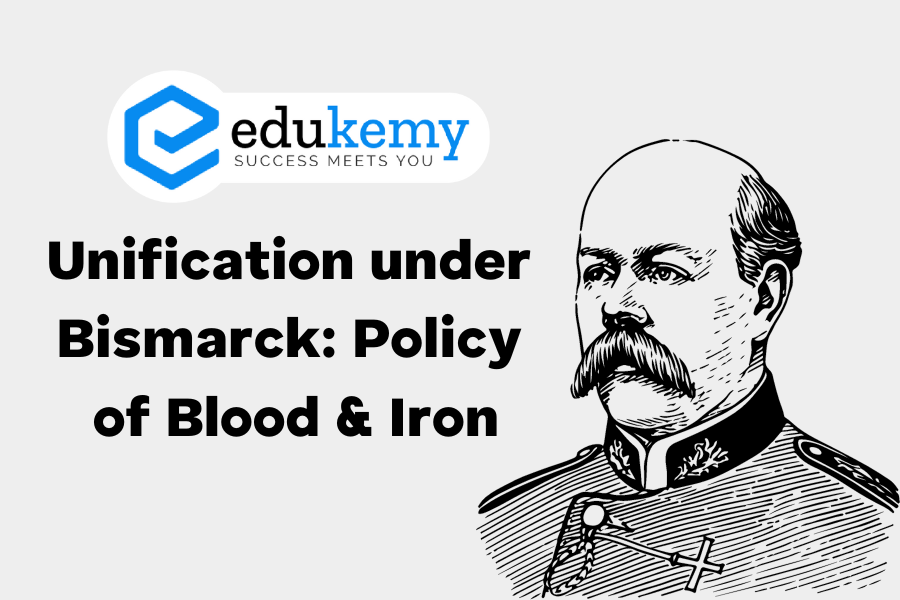
Otto von Bismarck, the skilled statesman and military strategist, played a crucial role in the unification of Germany. His policy of “Blood and Iron” aimed at achieving this unification through a combination of military force and diplomatic manoeuvring.
Contents
- 1 Key Steps in Bismarck’s Unification Strategy:
- 2 Impact of Bismarck’s Policies:
- 3 FAQs
- 3.1 1. What was Bismarck’s policy of “Blood and Iron”?
- 3.2 2. How did Bismarck’s policy of “Blood and Iron” contribute to German unification?
- 3.3 3. What were the key components of Bismarck’s policy of “Blood and Iron”?
- 3.4 4. What role did military force play in Bismarck’s policy of “Blood and Iron”?
- 3.5 5. How did Bismarck’s policy of “Blood and Iron” impact European geopolitics?
- 4 In case you still have your doubts, contact us on 9811333901.
Key Steps in Bismarck’s Unification Strategy:
- War against Denmark (1864): In 1864, Prussia, allied with Austria, waged a war against Denmark. The objective was to annex the territories of the German Confederation controlled by Denmark.
- Alliance with Italy against Austria (1866): Bismarck skillfully orchestrated an alliance with Italy against Austria, a move aimed at weakening Austria’s influence in German affairs. The resulting Austro-Prussian War of 1866 led to Prussia’s decisive victory over Austria.
- Dissolution of the German Confederation (1866): The defeat of Austria in the war resulted in the dissolution of the German Confederation, thereby dismantling a significant obstacle to German unification.
- Formation of the North German Confederation (1867): Bismarck established the North German Confederation in 1867, which united 22 German states under Prussian leadership. This Confederation excluded the Southern German states, like Bavaria, which initially remained independent.
- Franco-Prussian War (1870-1871): Bismarck’s skilful diplomacy, combined with tensions between France and Germany, led to the outbreak of the Franco-Prussian War. France, under Emperor Napoleon III, declared war on Prussia. The war ended with a decisive German victory, and France declared itself a republic in 1871.
- Final Unification (1871): The aftermath of the Franco-Prussian War provided the opportunity for Bismarck to bring about the final unification of Germany. On January 18, 1871, the German Empire was officially proclaimed in the Hall of Mirrors at the Palace of Versailles. King Wilhelm I of Prussia was crowned Emperor (Kaiser) of the new German Empire.
Impact of Bismarck’s Policies:
- Centralized Authority: Bismarck’s policies resulted in a centralized authority under Prussian leadership. The King of Prussia became the hereditary head of the new German Empire.
- Exclusion of Austria: Austria, traditionally a major player in German affairs, was excluded from the new German Empire, signalling Prussia’s dominance.
- Creation of a United Germany: Bismarck’s efforts culminated in the creation of a unified German state, which marked a significant turning point in European history.
- Long-lasting Effects: The unified German Empire under the leadership of Prussia would go on to play a major role in European politics and become a key player in the geopolitical landscape.
Bismarck’s skilful political manoeuvring and strategic use of military force were instrumental in achieving the long-cherished goal of German unification, establishing a powerful and influential nation-state in the heart of Europe.
FAQs
1. What was Bismarck’s policy of “Blood and Iron”?
A: Bismarck’s policy of “Blood and Iron” emphasized the use of military force and industrial strength to achieve Prussian dominance and unify the German states under Prussian leadership. It reflected his belief in the necessity of wars and diplomacy, backed by industrial and military might, to achieve the goal of German unification.
2. How did Bismarck’s policy of “Blood and Iron” contribute to German unification?
A: Bismarck’s strategic use of military force, particularly in the Danish War (1864), Austro-Prussian War (1866), and Franco-Prussian War (1870-71), helped to weaken opposition to Prussian dominance and pave the way for German unification. Additionally, his diplomatic maneuvering and realpolitik tactics exploited divisions among the German states, ultimately leading to their unification under Prussian leadership in 1871.
3. What were the key components of Bismarck’s policy of “Blood and Iron”?
A: Bismarck’s policy of “Blood and Iron” involved a combination of military strength, economic development, and diplomatic finesse. He modernized the Prussian army, promoted industrialization to enhance Prussia’s economic power, and skillfully manipulated alliances and conflicts to isolate and weaken potential opponents to German unification.
4. What role did military force play in Bismarck’s policy of “Blood and Iron”?
A: Military force was a central element of Bismarck’s policy of “Blood and Iron.” He believed that decisive military victories were necessary to assert Prussian dominance over the German states and to compel their eventual unification under Prussian leadership. Bismarck’s successful military campaigns in the Danish War, Austro-Prussian War, and Franco-Prussian War demonstrated the effectiveness of his approach.
5. How did Bismarck’s policy of “Blood and Iron” impact European geopolitics?
A: Bismarck’s policy of “Blood and Iron” significantly reshaped European geopolitics by establishing Germany as a major continental power and upsetting the balance of power that had existed for centuries. The unification of Germany under Prussian leadership altered existing alliances and rivalries, leading to increased tensions and eventually contributing to the outbreak of World War I. Additionally, Bismarck’s realpolitik approach influenced other European leaders and contributed to the rise of power politics as a dominant force in international relations.
In case you still have your doubts, contact us on 9811333901.
For UPSC Prelims Resources, Click here
For Daily Updates and Study Material:
Join our Telegram Channel – Edukemy for IAS
- 1. Learn through Videos – here
- 2. Be Exam Ready by Practicing Daily MCQs – here
- 3. Daily Newsletter – Get all your Current Affairs Covered – here
- 4. Mains Answer Writing Practice – here

